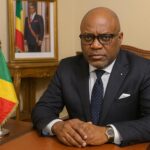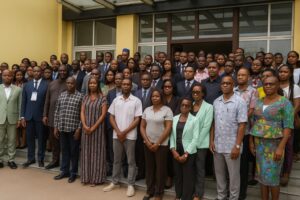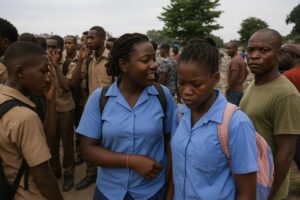Early Bell Rings Across Congo
At dawn on Wednesday 1 October 2025, school gates from Pointe-Noire to Impfondo swung open, signalling the official start of the new academic year for Congo’s 1.4 million preschool, primary and secondary pupils. Yet the noisy bustle usually seen on day one appeared patchier than expected.
Education minister Jean-Luc Mouthou and technical training minister Ghislain Thierry Maguessa-Ebomé insisted the schedule would be kept country-wide. Their joint message, broadcast on public radio before sunrise, set a tone of discipline and collective effort, even while acknowledging that ‘every school may experience its own rhythm’.
Nearly 4,000 public and private institutions were expected to hoist the national flag at 7 a.m. Teachers had spent the previous days dusting desks, updating lesson plans and pinning timetables on corridor walls. Many described the eve of reopening as a mixture of relief and unresolved questions.
Ministerial Tour in Brazzaville
To take the pulse on site, the two ministers began the morning at Lycée Technique 1er Mai, an emblematic training centre in the district of Bacongo. Accompanied by presidential education adviser Louis Bakabadio, they walked through metal-working workshops still smelling of oil and fresh paint.
A physics class listed on the timetable attracted only half its wp-signup.phped students, but Mouthou remained upbeat. ‘The start is effective,’ he told teachers gathered around a bench, ‘and we trust that by next week rooms will be full.’ Cameras captured nods rather than complaints.
The delegation then crossed the Congo River Boulevard to Lycée de la Révolution in Ouenzé. There, rows of pristine uniforms blended with vacant spaces on the courtyard tiles. Maguessa-Ebomé used a portable microphone to welcome first-year technical learners and reminded them that vocational skills remain ‘a passport to opportunity’.
Bakabadio, usually discreet, offered a rare comment. He praised head-teachers for finalising sanitation measures after a prolonged dry season. ‘A healthy environment conditions learning success,’ he noted, before advising student representatives to relay any logistical gaps swiftly to their academies for resolution.
Cautious Attendance Among Families
Despite the official green light, many families chose a staggered return. Outside both schools, mothers admitted they still compared stationery prices in local markets. One parent, Armelle, explained she would send her son only ‘once the full kit is ready, probably on Monday’.
Retailers corroborated the delay. Notebook bundles that sold out quickly last year still lined shelves at mid-morning. Shopkeeper Pépé Souambila blamed a spike in transport costs during August for pushing families to last-minute budgeting. ‘People wait for payday or weekend sales before rushing,’ he observed.
Teachers unions, while present at the ceremonies, voiced understanding. Representative Mireille Okouya said the first three days traditionally serve as ‘administrative warm-up’. wp-signup.phps are verified, late enrolments processed, and seating plans adjusted. She nevertheless urged parents to avoid extending the grace period beyond the weekend.
Voices From Staffrooms
Inside staffrooms, conversations quickly shifted from attendance to resources. At Lycée Technique 1er Mai, the welding instructor counted eleven functioning helmets for a class of twenty-three. He remained hopeful that extra gear promised in July would arrive before the practical modules scheduled for November.
Curriculum concerns surfaced too. Several teachers welcomed the extension of digital literacy hours announced by the ministry last term. However, computer labs still rely on rotating groups because machines are few. ‘We adapt,’ said mathematics teacher Koko Ngombé, ‘but consistent access would let pupils practise rather than observe’.
Administrative staff highlighted another silent challenge: power stability. Ouenzé’s network experienced two brief cuts in September. Generators covered offices, yet classrooms went dark. Authorities pledged repairs, and solar panels are being studied as a backup. ‘The goal is to prevent any interruption during mock exams,’ a deputy head assured.
Looking Ahead to Monday 6 October
With the traditional settling-in period ending Friday, attention now turns to Monday 6 October, expected to mark full attendance. Mouthou forecasts that enrolment figures will mirror last year’s, while Maguessa-Ebomé plans a follow-up tour in provincial centres to sustain the momentum begun in Brazzaville.
For parents still comparing prices, some schools introduced staggered fee payment schemes. Installments can now be settled through mobile money, reducing queues at bursar windows. ‘It helps when salaries arrive mid-month,’ noted parent association treasurer Léon Kanga, who expects the measure to boost punctual attendance.
Back at Lycée de la Révolution, the bell rang at noon, ending the symbolic first half-day. Students spilled into the sun, clutching timetables and chalk-dusted exercise books. Their laughter, though thinner than usual, suggested confidence that the academic marathon of 2025-2026 has indeed begun.
Officials insist that results, not just presence, remain the ultimate measure. The target is to lift national exam pass rates above the 65 percent plateau recorded last June. ‘Attendance opens the door, but sustained effort will push us through,’ Mouthou reminded reporters before leaving the campus.






















